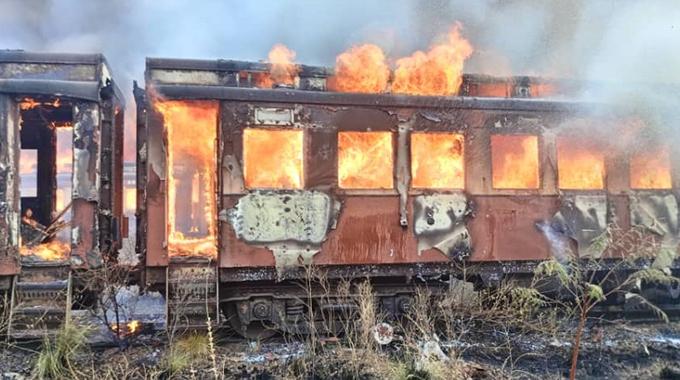News / National
NRZ fire likely sparked by discarded cigarette stub
19 Sep 2024 at 06:31hrs |
0 Views

A carelessly discarded lit material, possibly a cigarette stub, may have sparked the massive fire that destroyed 51 decommissioned passenger coaches at the National Railways of Zimbabwe (NRZ) mechanical workshop in Bulawayo on Monday, according to a report by the Bulawayo Fire Brigade.
The blaze, which left the coaches reduced to shells, raged for several hours before the Bulawayo Fire Brigade was able to contain it. Fortunately, no injuries or deaths were reported in the incident.
Six fire tenders were dispatched to battle the inferno, but when water supplies ran low, firefighters had to connect to the NRZ borehole system to continue their efforts. Water bowsers from the Bulawayo City Council were also brought in to assist.
NRZ public relations manager, Mr. Andrew Kunambura, stated that the financial losses resulting from the fire have yet to be quantified.
An investigation into the cause of the fire revealed that poor housekeeping at the workshop and a lack of operational water hydrants exacerbated the situation. Acting chief fire officer Mr. Mhlangano Moyo said the fire likely started with a discarded lit item, such as a cigarette stub, igniting dry grass between the coaches. The blaze spread quickly, damaging the railway tracks and impeding the fire brigade's response.
"The area is well guarded, but poor housekeeping allowed grass to catch fire, which then spread to the coaches. The lack of operational hydrants significantly hindered our operations," said Moyo. He also suggested that the fire could have been started by apprentices or students at the workshop.
The Bulawayo Fire Brigade made several recommendations to the NRZ to prevent similar incidents in the future. These included improving housekeeping, decongesting the area by disposing of decommissioned coaches, and installing proper fire safety equipment such as sprinklers or a drencher system to protect valuable infrastructure and locomotives.
Moyo also urged the NRZ to revive its internal firefighting teams for quicker responses to fires and to ensure that fires are reported immediately. He noted that the fire started at around 1 p.m. but was only reported at 2:02 p.m., delaying the fire brigade's arrival and allowing the fire to spread.
"The NRZ must also clear debris beneath locomotives to prevent the accumulation of flammable materials and fuels," Moyo added.
According to Mr. Kunambura, NRZ had already begun the process of scrapping the decommissioned coaches before the fire broke out.
The fire has prompted calls for more stringent fire safety measures at NRZ facilities to prevent future incidents that could cause even greater damage to property and infrastructure.
The blaze, which left the coaches reduced to shells, raged for several hours before the Bulawayo Fire Brigade was able to contain it. Fortunately, no injuries or deaths were reported in the incident.
Six fire tenders were dispatched to battle the inferno, but when water supplies ran low, firefighters had to connect to the NRZ borehole system to continue their efforts. Water bowsers from the Bulawayo City Council were also brought in to assist.
NRZ public relations manager, Mr. Andrew Kunambura, stated that the financial losses resulting from the fire have yet to be quantified.
An investigation into the cause of the fire revealed that poor housekeeping at the workshop and a lack of operational water hydrants exacerbated the situation. Acting chief fire officer Mr. Mhlangano Moyo said the fire likely started with a discarded lit item, such as a cigarette stub, igniting dry grass between the coaches. The blaze spread quickly, damaging the railway tracks and impeding the fire brigade's response.
"The area is well guarded, but poor housekeeping allowed grass to catch fire, which then spread to the coaches. The lack of operational hydrants significantly hindered our operations," said Moyo. He also suggested that the fire could have been started by apprentices or students at the workshop.
The Bulawayo Fire Brigade made several recommendations to the NRZ to prevent similar incidents in the future. These included improving housekeeping, decongesting the area by disposing of decommissioned coaches, and installing proper fire safety equipment such as sprinklers or a drencher system to protect valuable infrastructure and locomotives.
Moyo also urged the NRZ to revive its internal firefighting teams for quicker responses to fires and to ensure that fires are reported immediately. He noted that the fire started at around 1 p.m. but was only reported at 2:02 p.m., delaying the fire brigade's arrival and allowing the fire to spread.
"The NRZ must also clear debris beneath locomotives to prevent the accumulation of flammable materials and fuels," Moyo added.
According to Mr. Kunambura, NRZ had already begun the process of scrapping the decommissioned coaches before the fire broke out.
The fire has prompted calls for more stringent fire safety measures at NRZ facilities to prevent future incidents that could cause even greater damage to property and infrastructure.
Source - The Chronicle
Join the discussion
Loading comments…



























